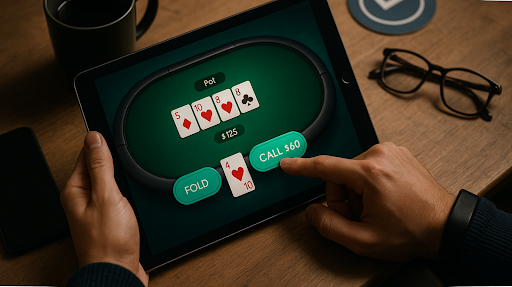It’s hard to say exactly when online poker started to look so different, but it definitely feels more complex than it was even a handful of years ago. Technology, layered with all these new security measures, keeps shaping and reshaping the experience. These days, it seems like folks expect things to just work: fast dealing, clear rules, not too much downtime. There’s a growing buzz, at least if you follow industry talks, about the market expanding, USD 153 billion by 2030, says Emergen Research (though, numbers like these always seem a bit slippery).
What’s driving it all? Tech, yes, but that’s not the full picture. There’s this mix, digital ethics, privacy worries, a bit of regulatory pushback. With the leaps in mobile design, new network setups, and artificial intelligence floating around, none of this stands still for long. Standards keep inching upwards, both for how people play and, maybe more importantly, for how they’re protected.
Artificial intelligence and security shape the new poker experience
These artificial intelligence tools, hard to escape them now, serve a couple of roles on a poker site. Sometimes they’re your silent analyst, nudging you with data, pointing out where you might’ve gone off track. The feedback comes fast, just as you’re about to make that questionable call. But there’s another side: AI patrolling the halls for dodgy behavior, catching patterns humans might miss.
It’s not perfect, but platforms have claimed a mild drop (about 22%) in bot detection incidents after rolling out these automated checks since 2022. A lot of sites now lean into things like biometrics for ID checks, fingerprint, facial scan, that sort of thing, which, so far, appear to block most common break-ins. The use of machine learning doesn’t really slow down once it starts; if anything, its influence keeps deepening as platforms expand.
Blockchain creates transparency and faster payments for players
Blockchain, interestingly, wormed its way into a lot of the online gaming world, not just for hype, either. Digital ledgers, with a way of recording things so nothing slips between the cracks. Online poker game platforms increasingly implement blockchain to ensure every outcome and payout remains public and unalterable, which satisfies growing player demand for fairness audits.
What happens next? Well, the introduction of smart contracts tends to chop waiting times for payouts, sometimes to just a few seconds. For players keeping an eye on privacy, crypto wallets, when used, offer a neat alternative to conventional banks. There’s some interest, too, around NFTs: avatars, collectible cards, tournament entries.
People can actually prove they own these digital bits, and occasionally trade them in a secondary market, with operators getting a small piece (about 5 to 10 percent, or so it’s reported). In a way, this technology is shifting how trust and ownership work on these platforms.
Mobile-first software and immersive interfaces rise in popularity
The mobile shift isn’t slowing at all. More and more, people reach for their phone or tablet to take a seat at a digital table, industry estimates talk about upwards of 77% of sessions happening on mobile now, at least according to Bluffing Monkeys. Apps are noticeably smoother, even if your phone’s hardly the latest model. Some of this is probably down to leaner software and better network connections.
The bigger platforms are running events with tens of thousands logged in at once, and, thanks to cloud stuff and new 5G rollouts, they’re mostly managing to keep lag under a dozen milliseconds for city players. On top of that, companies have started dabbling in VR rooms and customizable 3D avatars. So, even if you’re just playing from your kitchen table, the experience increasingly mirrors the realism of in-person gaming environments. If ease of use and speed keep topping priority lists, these mobile-friendly, visually appealing setups aren’t going anywhere.
Responsible gambling tools and regulatory advances lead to safer experiences
You can spot responsible gaming features baked into most apps these days, session reminders, cooling-off timers, places to set your own deposit or spending caps. No one claims this eliminates risky play, but at least it can nudge players to pause and think. Visibility plays a role, too: stats and histories pop up right inside your player dashboard. Security layers have thickened, with SSL protection and two-step logins almost everywhere you look.
As for regulations, the legal map keeps moving. Right now, about seven US states have locked in legalization, and local lawmakers in a handful of others are still debating. Operators, eager not to misstep, depend increasingly on compliance software just to keep up with the shifting requirements, ID checks, rule variations, all that. There are ongoing debates about how far platforms should go with AI, some say the line between “helpful” and “unfair” can get awfully blurry. Still, you get the sense discussions around digital responsibility, if anything, are ramping up.
Conclusion on responsible gambling in the digital era
Progress brings Technological progress continues to simplify access and diversify game features. Still, with every technical boost, the need for strong digital protections becomes harder to ignore. Operators, at least the thoughtful ones, may put ethics, security, and clear rules near the top of their to-do list.
The basics count: reminders, spending limits, secure ways to move your money. As new rules come into play, the question remains open, can the industry balance periodic tech leaps with enough care for its players? Probably, though it’s not a given. Each new feature, after all, creates both an opportunity and a responsibility.
